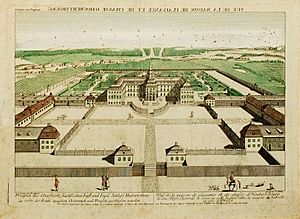Treaty of Hubertusburg facts for kids

Hubertusburg about 1763
|
|
| Context | End of the Third Silesian War (part of the Seven Years' War) |
|---|---|
| Signed | 15 February 1763 |
| Location | |
| Negotiators |
|
| Signatories |
|
| See also: Treaty of Paris (1763). | |
The Treaty of Hubertusburg (which means Peace of Hubertusburg in German) was a very important agreement signed on February 15, 1763. It was signed at Hubertusburg Castle by three powerful groups: Prussia, Austria, and Saxony. This treaty officially ended the Third Silesian War.
This treaty, along with the Treaty of Paris signed five days earlier, brought an end to the huge conflict known as the Seven Years' War. The Treaty of Hubertusburg mostly kept the borders the same as they were before the war. Austria and Saxony gave up their claims to the Silesian lands that Prussia had won earlier. This treaty showed that Prussia was now one of Europe's main "great powers." It also made the competition between Austria and Prussia even stronger.
Contents
Why the War Started
The main reason the Seven Years' War began was because Austria wanted to get back a rich area called Silesia. Prussia had taken Silesia from Austria in an earlier war. Maria Theresa, who was the ruler of Austria, Hungary, and Bohemia, gathered many allies. She got support from Russia, Sweden, Saxony, Spain, and France. Their main goal was to fight against Prussia and its ally, Great Britain.
However, it was King Frederick II of Prussia who started the fighting. He attacked and took over Saxony in 1756. This action kicked off the Seven Years' War.
Early Years of the War
The Seven Years' War began in 1756. Prussia found itself fighting against a strong group of allies. These included Austria, Russia, France, and Sweden. Even though many parts of the Holy Roman Empire voted against the war, Frederick still pushed to make Prussia stronger. He wanted to expand its influence, power, and land.
In the first half of the war, the Prussian army was very successful. They won several important battles. At the Battle of Rossbach on November 5, 1757, the Prussians defeated the French and other Imperial troops. Later in 1757, they beat the Austrians at the Battle of Leuthen. In 1758, they also defeated the Russians at the Battle of Zorndorf.
Challenges and a "Miracle"
As the war continued, things became harder for Prussia. Sweden joined the war, and it seemed like almost all of Europe was against King Frederick. By 1759, Russian forces had taken control of eastern Prussia. The city of Berlin was even occupied for a few weeks. Austrian armies also invaded Prussia from the south. King Frederick II was running out of soldiers and was in a very difficult spot.
Meanwhile, Prussia's allies, the British and Hanoverians, were fighting the French. In 1758, their army defeated the French and took the town of Münster. In 1759, Imperial troops invaded Saxony and forced the Prussians out.
Then, two big things happened that helped Prussia turn the war around. First, the British and Hanoverians became more effective in fighting the French. Second, and most importantly, Russia and Sweden left the war in 1762. This happened because Empress Elizabeth of Russia died. Her successor, Peter III, actually admired King Frederick. He quickly signed a peace treaty with Prussia. This agreement, called the Treaty of Saint Petersburg, meant Russia made peace and gave back all the lands it had taken. Sweden also made peace that same year. This sudden change in luck for Prussia was called the "Miracle of the House of Brandenburg."
End of the Fighting
With Russia and Sweden out of the war, the Austrians were left fighting alone in the east. They were soundly defeated by Prussia at the Battle of Burkersdorf in July 1762. The French had also suffered many losses. In America, they lost important places like Louisbourg (1758) and Quebec (1759). In India, British victories had greatly weakened French power.
Spain joined the war in 1761 to help France, but it didn't change much. The war had become very unpopular in France.
What Happened After the Treaty
After a lot of talking between the tired countries, peace was finally made. Prussia, Austria, and Saxony signed the Treaty of Hubertusburg. Great Britain, France, and Spain signed the Treaty of Paris.
The Treaty of Hubertusburg brought things back to how they were before the war for Prussia, Austria, and Saxony. But it clearly showed that Prussia was now a major power in Europe. The Treaty of Paris made Great Britain the world's leading colonial empire. This had been Britain's main goal in the war. France, on the other hand, lost most of its lands overseas.
Sometimes, the phrase "Hubertusburg Peace" is used to describe any treaty that brings things back to the way they were before a conflict started.
See also
- List of treaties

